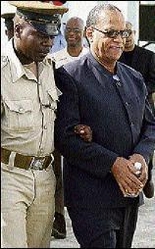Coard freed - Former Grenadian deputy PM to make Jamaica home base
Published: Sunday | September 6, 2009

Grenada's former Deputy Prime Minister, Bernard Coard (right), is escorted by a prison guard upon his arrival at the Grenada Supreme Court for a resentencing hearing in St George's in 2006.
Bernard Coard, the former deputy prime minister of the short-lived People's Revolutionary Government (PRG) in Grenada, who was imprisoned for 26 years for the murder of Prime Minister Maurice Bishop in 1983, intends to join his wife in Jamaica.
Coard was freed yesterday after the governor general accepted advice to remit the remainder of his sentence.
The 65-year-old was on his way just before midday yesterday, along with 13 other prisoners from the Richmond Hill prison, some of whom are former members of the now-defunct People's Revolutionary Army (PRA), which carried out the assassinations.
"I will be spending as little time as possible here (in Grenada). My wife is not well. Her health is not very good. I will join her in Jamaica as soon as I can secure a passport. I will be based there," the CANA news agency quotes Coard as saying yesterday.
Wife already in Jamaica
His wife, Phyllis, has been in Jamaica, since March 2000, where she has been receiving treatment for a severe medical condition.
Both Coard and his wife were part of the 'Grenada 17' who were convicted of murdering Bishop and members of his Cabinet in 1983.
The PRG came to power in 1979 after it ousted then Prime Minister Sir Eric Gairy in the first successful coup in the English-speaking Caribbean.
But the left-wing government that had close ties with Cuba, the Caribbean's only Communist country, was split along ideological lines, with some members supporting Coard, and others Bishop.
Bishop and several members of the government were placed under house arrest and later shot and killed by members of the PRA.
Three of those convicted - Lester Redhead, Christopher Stroude and Cecil Prime - were released in 2007 after the High Court ruled that they had spent enough time in jail for their roles in the 1983 killings.
The court had also ruled that 10 other convicted men, including Coard, would serve 40 years' hard labour on their murder convictions, clearing the way for them to be freed within three years.
The new court sentencing followed a ruling by the London-based Privy Council, the island's highest court, that overturned the death sentences that had originally been imposed on the former government and military officers.
The Privy Council had ruled that the death sentences were unconstitutional and, as a result, this also invalidated the process by which those sentences were later commuted to life imprisonment.








